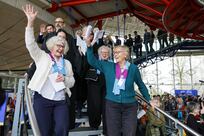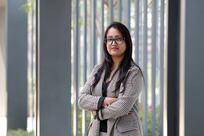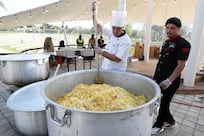Two foreign bidders for a major power plant in Saudi Arabia have withdrawn from the project as business leaders in the kingdom urged the government to foster ties with international infrastructure providers.
Such projects could languish as the government turns its attention to social and political issues, they said yesterday at the Jeddah Economic Forum, which ends today.
But the kingdom is facing an uphill struggle to attract companies from overseas during the region's political unrest.
"There is huge need for collaboration between local know-how and international experience," said Dr Nahed Taher, the chief executive of Gulf One Investment Bank, which specialises in infrastructure projects.
"The government is burdened with a lot of projects on their shoulders and they have a lot to do."
Dr Taher made her comments as it emerged yesterday two foreign companies have withdrawn from the bidding to build the 1,500-megawatt Qurayyah power plant.
AES, the US-based power company, pulled out of the bidding for the gas-fired plant, which it was seeking to build and operate with Qatar Electricity & Water Company.
"Our partner AES chose not to participate," Fahad al Mohannadi, general manager of the Qatar company, told Bloomberg News.
"Because they withdrew we had no choice but to withdraw because we are a small participant there. We are now looking at other options" in Saudi Arabia, Mr al Mohannadi said.
AES could not be reached for comment and its reason for leaving the bidding is not known. Saudi Arabia's government has funnelled cash into the economy recently, but projects that have been announced have largely focused on the construction of houses, rather than the roads and utilities that serve them.
Business executives have urged more use of public-private partnerships as a means of moving the kingdom's economy forward.
"It could be a catalyst for future broader sector reforms and privatisations," said Ali al Barrak, the chief executive of the Middle East's largest utility firm Saudi Electric.
Mr al Barrak said his company had not seen any disruption to its plans, but expressed concern about current conditions on financial markets.
Dr Taher said one of the biggest challenges was "the lack of a unit for public-private partnerships within the umbrella of the [Saudi] ministry of finance".
This meant a number of deals quickly became bogged down in attempts to acquire political support.
After the financial crisis, a number of projects intended to have been funded with the help of international companies were now stalled or had been taken on by the government alone, Dr Taher said.




